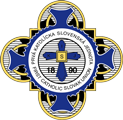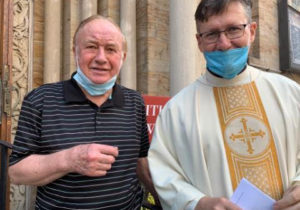One Slovak Family: Expanding Slovak Citizenship
Michael J. Kopanic, Jr., Ph.D.
 Slovak and Canadian Americans trace our roots to our ancestors’ homeland of Slovakia and some of us prize our Slovak background. We value our traditions and culture, love our unique Slovak foods, and wish to retain our ties with Slovakia. We feel Slovak as part of our being. But when we travel to Slovakia, or do business there, we are officially considered to be “foreigners.”
Slovak and Canadian Americans trace our roots to our ancestors’ homeland of Slovakia and some of us prize our Slovak background. We value our traditions and culture, love our unique Slovak foods, and wish to retain our ties with Slovakia. We feel Slovak as part of our being. But when we travel to Slovakia, or do business there, we are officially considered to be “foreigners.”
Global Slovakia wants to change that status. It has launched a movement entitled “One Slovak Family” for those who wish to recover their rights of citizenship, and/or facilitate the process of obtaining dual citizenship based on Slovak ancestry. But the broader aim is to reconnect with our Slovak roots and tap the talent which has left their family’s original homeland.
Since the late 19th century, one-third of Slovaks have emigrated abroad, and that trend has continued since the Velvet Revolution of 1989. Emigration from Slovakia has ranked among the highest of any peoples worldwide, second only to the Irish. Many “hyphenated” Slovaks are scattered throughout the world – in the USA, Canada, Australia, the United Kingdom, Ireland, and many other countries around the globe (2 million in just the USA have Slovak roots!).
Some of Slovakia’s best and most talented people have settled abroad, and continue to do so because of higher wages and the perception of less opportunity in Slovakia. Over the course of history, many factors have contributed to the straining of ties with our original homeland: poverty, wars, onerous military drafts, Magyarization, Czechization, anti-immigration laws, totalitarian governments, bureaucratic inefficiencies, and time itself.
Most other countries (for instance, Czech Republic, Poland, Ireland, Italy, etc,) make it relatively easy for the descendants of emigrants to return to their family’s homeland, and to obtain citizenship. Unfortunately, Slovakia does not rank among them and it “makes it needlessly hard for her sons and daughters to come home.”
Slovakia needs to grow as a country and now faces a declining birth rate; the Slovak population could decline by as much as 30% given current trends. Thus Slovakia must gain more citizens in order to even maintain its population at today’s count. By extending Slovak citizenship to Slovak descendants, it would help unite our nation. When we grow in population size, we also grow in influence and gain more political and economic sway around the world.
In summary, “One Slovak Family” aims to reconnect Slovaks abroad with their homeland and reunite the Slovak family. As a starting point, it is lobbying so that the Slovak government will rewrite legislation on the conditions for becoming a Slovak citizen. It also aims to harness the full power and influence of the larger Slovak community in the world and facilitate its connections with the homeland. Success in this endeavor might achieve the following goals:
Slovakia will gain representatives around the world.
Emigrants will champion the interests of their homeland abroad.
They will publicize and raise awareness of the country’s opportunities in powerful places, circles, and through networks.
They will make it easier for Slovak delegations, leaderships and businesses to engage and bridge build with native communities abroad.
Slovak citizenship would also provide holders with all the rights and benefits of EU membership, including the right to attend universities in the EU, facilitate business dealings, etc.
“Slovakia can only benefit from uniting its population: we are ONE SLOVAK FAMILY.” Join the effort and visit the website: Join us to learn more: www.oneslovakfamily.com
The Team
Here is a list of the leading personalities on the “One Slovak Family” Team.
Dr Zuzana Palovic, the founder of the non-governmental organization, Global Slovakia and author.
Parviz Malakouti-Fitzgerald, an American-born immigration attorney of Slovak/European and Iranian heritage.
Samuel Ďurovčík, a native of Bratislava, is a student at Masaryk University’s Faculty of Law in Brno, Czech Republic, specializing in Administrative and Citizenship Law.
Professor Martin Javor is a Slovak historian and associate professor of history at the University of Prešov. He is also the director of the Museum of Emigration to North America – Kasigarda, located in Eastern Slovakia.
Professor Michael Kopanic is an Adjunct Professor of History at the University of Maryland Global Campus, formerly UMUC. A specialist on Slovak history, he has spent his academic career learning, teaching, and writing about history, culture, and the Slovak language.



